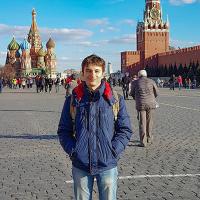It’s less than ten years when MEPhI has opened its doors to international students, but it has become one of the most international universities in Russia. Why should a graduate of a European University enter the master’s degree program in a Russian nuclear University? How true are foreign stereotypes about life in Russia? A citizen of Spain, a master’s degree student of MEPhI Iker Montero de Pedro told about that.
– Iker, why did you choose to receive master’s degree in Russia after bachelor study in Spain?
– When I entered the University of the Basque Country, I was interested in two areas: "Material engineering" and "Energy". As a result, I chose to specialize in materials engineering. But here, at MEPhI, I found an opportunity to combine both of my main hobbies.
In addition, Russia is one of the leading countries in the field of energy, including nuclear one. So I decided to come here. Now I am finishing the first year of the master's degree, one year is ahead.
– Was it difficult for you to enter MEPhI?
– The procedure was quite long. It took some time to exchange letters by e-mail and fill various documents. The entrance exam had an acceptable level of complexity, it included general questions on materials engineering.
– What is the difference between universities in Spain and?
– I think the educational process doesn’t differ a lot. Teachers give lectures and the material for self-study both in Russia and Spain.
One of the main differences is the performance evaluation system. For example, in Spanish universities there are no credits like "passed - not passed", students have only exams with scores. Everything else is very similar.
As for the size of a study group, I have an advantage over Spanish and Russian students: in my English-speaking group there is only one student except me. For comparison, in my group at the University of the Basque Country we had 70 people, in another group – 100 people.
– What do you plan to do after graduation?
– My main goal is to try to find a job. I don’t want to limit the scope of search and cut off options. When I started looking for a master's degree, I did not think that I would eventually come to Russia. Therefore, I will consider a variety of possibilities.
My dream is to work in the space industry. That's why I chose to specialize in materials engineering. I would like to know how different materials behave when exposed to radiation. The theme of my master's thesis is "Modeling of structural changes of the crystallographic structure in cold – rolled Cu-Nb (copper-niobium) sheets". I am sure that the knowledge that I acquire here at MEPhI will be useful to me in my future work.
– How has your idea of Russia changed after your arrival?
– On the Internet, you can find many stereotypes about life in different countries. Usually it is said that Russian people are very reserved and cold. But everyone I’ve met here is very friendly. I've never had a problem.
I think I got over the stereotype, at least for myself. I always tell my relatives and friends that Russian people are certainly not as they are told about.
Of course, there is another stereotype: “It is very cold in Russia!” That's not quite right either. For example, on May of this year it has been incredibly warm, the air temperature was higher than in my homeland.
– What did make a special impression on you in Moscow?
– There are so many people here! We have about 300 thousand inhabitants in the largest city of the Basque Country, Bilbao. And here, in Moscow, – 12 million. So wherever you go, there are a lot of people. On the Victory Day, on May 9, I went to the city center, and was amazed at how many people were walking around.
I do not think that this is the case throughout Russia, I am sure that this is only a feature of the capital city.
– Do you plan to learn Russian?
– I'm already studying it; Russian language is included in the master's program. My language group includes one student from Egypt and five from Nigeria.
– How much time did it take to adapt after coming to Russia?
– I think no one will ever get used to the winter weather in Russia. As for the adaptation to culture and to people, it takes a little time. I think we're not so different. At the household level, everything went smoothly for me as well.
– What can you advice to those who decide to get higher education in Russia?
– Try to learn the basics of the Russian language before arrival. I did, and it helps me go shopping, asks the bus drivers if I would get to the right destination. Of course, you cannot expect that you will come and immediately learn to speak Russian. Spend at least three summer months learning the language before coming to Russia.
As for the knowledge of the basics of culture and history, I read books, learned about the main historical events in Russia, starting with the Varangians. I also read about holidays to understand, for example, why May 1 and 2 are days off, and what is so special about December 31. It is especially difficult for me to understand the meaning of the Old New year and do without a big celebration on December 24.
– Are you going to the World Cup?
– I will stay in Moscow until the beginning of July, and will catch half of the championship. If I have at least a drop of free time among tests and examinations, of course, I will try to visit competitions. Of course, tickets for the main matches are not available, but I will try to buy it for the less important games.






